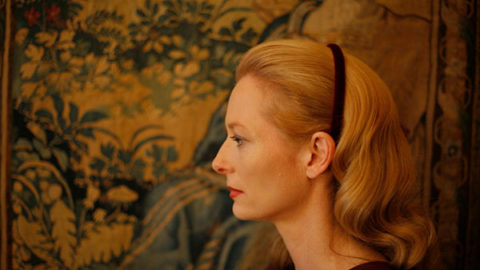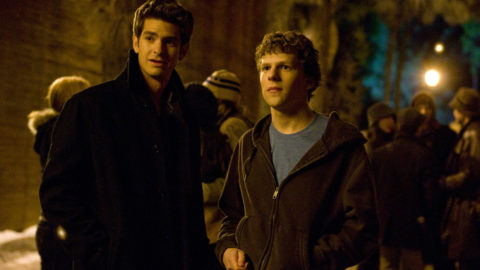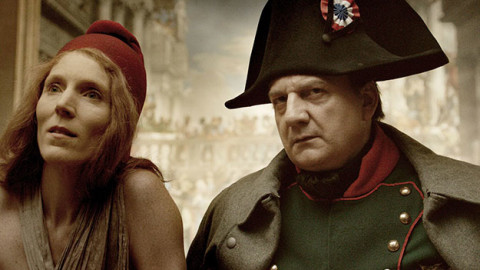
Review: A Bigger Splash
In the slick, ludicrous, semi-entertaining A Bigger Splash, Tilda Swinton plays Marianne, a towering rock star who is recuperating from throat surgery on the volcanic island of Pantelleria in the straits of Sicily with her six-year lover Paul (Matthias Schoenaerts), a documentary filmmaker and recovering suicidal alcoholic. For an art-house sun-and-skin fantasy like this one, inspired by Jacques Deray’s swoony 1969 French hit La Piscine, that throat-surgery bit—which Swinton came up with—is a masterstroke, though not for the intended reasons. Swinton told journalists at the Venice Film Festival that she suggested the idea because she was worn out when the project came her way and “had nothing to say,” but she also said it supported the theme that “communication [is] a really tricky business.”

What Marianne’s near-muteness mostly does is accentuate the hushed animal eroticism of these well-formed specimens embracing in and out of their villa’s pool. It also makes her a scintillating foil to the film’s third major character, Harry (Ralph Fiennes), Marianne’s previous six-year lover and former record producer, who is a V8-powered motormouth. For a while, she even hides from Harry that she can whisper. It’s a grand excuse for Swinton to express her character’s glam-rock divinity in florid theatrical gestures.
Harry announces his arrival on Pantelleria just before his plane flies over the heads of Marianne and Paul. It’s as if the director, Luca Guadagnino, best known for the high-camp I Am Love (09), were intent on mounting a parody update of “the jet set.” When Harry lands, accompanied by his heretofore unknown, college-age daughter Penelope, or “Pen” (Dakota Johnson), he immediately upsets Marianne and Paul’s shared life. At the midway point, Harry attracts a crowd to a karaoke café first by rocking out to Marianne’s regal amusement, and then by performing, with Pen, a steamily inappropriate duet to the Natalie/Nat King Cole smash “Unforgettable.” Harry, an unregenerate let-it-all-hang-out rocker, isn’t shy about admiring the almost-grown beauty of a daughter he didn’t know as a child. But his goal is to take back Marianne, the love of his life, whom he had virtually handed off to his onetime best friend Paul. His daughter in turn is determined to prove to Paul that Pen is mightier—sexually, anyway—than Marianne.

Just because the director ultimately takes all this ultra-seriously doesn’t mean we have to. Guadagnino thinks that he has both rejuvenated and deepened La Piscine by grafting on what he’s called “a world that is no more—the rock ’n’ roll world of the end of the 20th century” and contrasting it with “a sort of new conservatism that is, in a way, ruling us today.” Presumably that’s why Pen observes that Marianne is domesticated for a rock star, and Harry declares that Paul is too square for her. How profond!
The title A Bigger Splash refers to British artist David Hockney’s painting of a California swimming pool and to Jack Hazan’s 1973 documentary about Hockney’s life in London, Geneva, New York, and L.A. A better borrowed name for this new movie would be The Trouble with Harry. It plays like a black-comic suspense film built on Harry’s bad behavior and worse manners rather than, in Guadagnino’s words, “a completely modern psychological relationship drama,” or a clever, sensual, ultra-commercial thriller like Deray’s.
Happily, Fiennes comes through for his director. Whether tearing off his clothes in heterosexual abandon, frugging like an improbably rhythmic Elaine Benes to the Rolling Stones’ “Emotional Rescue,” or mischievously imitating the bridge-keeper from Monty Python and the Holy Grail, Fiennes performs with a spend-it-all inventiveness and energy that are alternately irritating and infectious. In recent years, Fiennes has proven himself to be a born entertainer as well as a consummate actor. In A Bigger Splash, he uses all his showmanship, imagination, and empathy to vitalize a character who is both the life of the party—and, in one uncanny twist, the death of it.
Michael Sragow is a contributing editor to FILM COMMENT and writes its Deep Focus column. He is a member of the National Society of Film Critics and the Los Angeles Film Critics Association. He also curates “The Moviegoer” at the Library of America website.






